- Home
- Lissa Evans
Spencer's List Page 2
Spencer's List Read online
Page 2
‘You mean that you’d told someone to mend it and they didn’t?’
‘Well, it all depends on whether you view the word “told” as an appropriate –’
‘Who?’
Claud shuffled miserably. ‘I don’t think we need a scapegoat for this particular –’
‘I’m not asking for a scapegoat, I’m asking who was told to mend it and didn’t.’
‘I’m really not sure we want to –’ A police car howled by, making speech impossible for some moments.
Fran changed tack. ‘OK. Was it Costas?’ she asked in a reasonable voice, naming the most reliable person on the farm.
Claud was startled into frankness. ‘Costas? No, of course it wasn’t.’
‘No, I didn’t think so. You’d have told me if it had been someone competent or useful, because they’d certainly have had some kind of excuse.’ She impaled Claud with a look. ‘So it must have been someone who’s a total waste of space.’
He opened and shut his lips a couple of times, but nothing came out.
‘I’ll kill him.’ She turned and marched towards the staffroom, Claud bleating ineffectually behind her.
Barry had the foresight to look slightly worried when Fran banged the door open. He was by the sink, wiping mud from his waterproof jacket with the washing-up sponge, his curly hair haloed by the morning sun.
‘Hiya,’ he said, cautiously. ‘I was just going to make you a mug of tea. I thought you might need one,’ he added, with a humorous little lift of the eyebrows.
Fran pushed the door shut behind her, blocking Claud’s worried face from view. ‘I’d like a word with you.’
‘Sure.’ He smiled, exuding his usual sleepy charm – the sleepy charm that Fran had stupidly assumed was jet lag when he’d been interviewed for the post of Agricultural Education Assistant Grade 5. He’d just come back from a holiday in Australia, and it had seemed a reasonable explanation for his excessively relaxed approach to the panel’s questions. Unfortunately it had turned out that he was always like that.
She sat down, and gestured brusquely towards another chair.
‘Sure you wouldn’t like a cuppa first?’ He waggled a mug at her.
‘No.’
‘Right.’ He seemed to sense the seriousness of the impending conversation and, sitting down, clasped his hands on the table in front of him and leaned forward with an earnest expression, as if auditioning for the role of a social worker.
‘What’s the problem?’
‘I’ll give you three guesses,’ said Fran.
‘It’s about Porky, isn’t it?’ He looked at her sympathetically. ‘Yeah, I’m afraid he made a bit of a mess of your veg. We just couldn’t get a grip on him, you see. I must have fallen over about fifteen times, that coat’s never going to be the same again.’ He tried a smile, and then put it away again.
‘And why was Porky out in the first place?’
‘Oh right, right. I see.’ He nodded, as if everything had come clear. ‘Yeah, I just hadn’t had time to get round to that fence, I’m afraid. Sorry about that, Fran. Claud asked me to do a poster for the autumn open day and then there was that kid yesterday I had to take for a tetanus jab and then I had to get off early for my girlfriend’s birthday so…’ He shrugged ruefully. ‘You know how it is when things get in the way.’ He looked at her, apparently waiting for an understanding laugh of assent.
Fran felt a neurone snap somewhere deep within her brain. ‘Oh for fuck’s sake, Barry,’ she said, with a vehemence that made him jump, ‘don’t be so ridiculous. An enormous great pig has completely wrecked my section of the farm and it’s all your fault because you’re a stupid, lazy, spaced-out berk.’ The last word was a shout and as she motored on she felt a certain pleasure at the shock on his face. ‘You know, when I think of all the students we interviewed for your job I could bloody well weep. We could have thrown a stone in a –’ she cast around bullishly and spotted a poster above the sink ‘– donkey sanctuary and hit something with more ability and common sense than you.’
Barry recoiled slightly, as if he’d been punched.
‘You’ve been given chance after chance but you think just because you’ve got a nice smile you don’t have to do any bloody work. Everything you touch is botched. You can’t lift a potato without needing a fifteen-minute tea break. The least you could be doing now is trying to restore some of the damage instead of sitting here cleaning your bloody coat like a member of the landed gentry. God, the work I put into that garden…’ She gulped for breath and tried to restore her breathing to a normal rhythm. Barry sat as if stuffed. ‘So why aren’t you out there? Go on, get out there.’
Like a very old man, Barry got to his feet. Under the remains of the tan his face was pale, and his eyes flinched away from Fran’s as he passed her. Following him to the door, she watched him tramp down the long, sloping parallelogram of the farm, past the hen house where Spike was collecting eggs, under the flyover, whizzing with cars like a vast abacus, and towards the dented patch of green where Porky had frolicked.
Fran glanced at Claud, hovering beside the boot scraper, and then looked away. Down by the pond she could see Barry starting to fish for the hurdle.
Claud eased himself towards her. ‘I’m not sure…’ he began.
‘I know,’ said Fran, tiredly, leaning against the doorpost. ‘I’d had a bad morning, even before I got here.’
‘He looked a bit upset.’
‘I’m a bit upset.’
‘Even so, I think that maybe…’
A passing juggernaut gave a great blast of its air horn. Claud tried again.
‘I think that maybe you should have a… a calmer chat with him. After all, it wasn’t as if he… he deliberately allowed Porky to…’
Fran nodded, slowly.
‘Perhaps you could make him some tea. Bring it down to the pond and –’
‘Yeah, OK.’
‘Peace offering.’
‘OK.’
‘I think we’ve got some biscuits.’
‘OK, Claud.’
‘Good. Good.’ He clapped his hands together. ‘Right… well, all hands on deck for the great restoration. I think first of all I should… er, perhaps call some kind of informal meeting to, er, discuss…’
2
It was a thin afternoon for tourists in Trafalgar Square, and the birdseed man, who was wearing thermal gloves and a baseball cap with ‘I Love New York’ on it, sold Spencer two bags of yellow grit for the price of one. He said, ‘It’s your lucky day,’ as he handed them over, and Spencer asked, ‘Starting from when?’ but received no reply. The Square looked rather fine in the low sunlight that streamed along Pall Mall, turning the windows of South Africa House crimson and jewelling the KFC boxes that blew between the fountains.
Spencer positioned himself just under Nelson’s Column, filled both hands with birdseed and held them out at arm’s length, feeling like a combination of the crucified Christ and the Scarecrow in Wizard of Oz.
For a moment nothing happened, and then there was a mild commotion in his immediate vicinity and two smartish buff-coloured pigeons landed on his right hand and started devouring the seeds with cartoon-like velocity. Next a hideously diseased, possibly leprous, one-legged grey pigeon landed on his left hand, balanced precariously on its warty remaining foot and quite deliberately pecked Spencer on the wrist. He shook his hand violently to dislodge it, dropping most of the seed as he did so, and suddenly every pigeon in Greater London was in the air, heading towards him like a bomber squadron, wheels down, flaps set, tails flattened for landing. The sky was black with bodies, and the world only fitfully visible behind a screen of wings. He cringed as pigeons banked and swooped and landed and took off again; the ground was hidden beneath a shifting carpet of feathery backs and the air vibrated with the throaty calls that he had always found pleasantly soothing, and which now sounded like the rallying cries of an army crazed with bloodlust.
Covering his head with his arms, he ducked and r
an. The carpet exploded into a wall of wings and then he was through, and safe, and all at once aware that he was being videoed by a party of Japanese pensioners. He counterfeited a casual wave and walked away, trying to look like someone who was really enjoying himself.
His other assignment was within easy reach. The London Pride (‘Sixty Sights in Sixty Minutes’) was a double-decker bus painted in an ill-advised combination of yellow and purple. It departed at twenty-minute intervals from just outside the National Gallery, employing a very old man in a fake Beefeater costume to stand on the pavement shouting, ‘London Pride, HAWL the Sights,’ at passers-by.
Spencer hesitated for a while, overwhelmed by inertia at the prospect. There were only three passengers on the lower deck, and two of them had their eyes closed. The third, a small child, stared fixedly through the window at Spencer, her finger up her nose to the second joint.
On some invisible signal the Beefeater changed his shout to ‘London Pride, departing in FUHIVE minutes’ and the engine started. Spencer climbed on board very slowly.
‘How much is it, please?’
‘Three pounds downstairs five pounds upper deck,’ said the driver in a monotone, his eyes fixed on a far and invisible horizon.
‘Five pounds, please.’ He placed a note on the change tray.
‘No drinks or ice creams, no standing up while the bus is in motion, no getting off except at designated stops.’
‘Right.’
‘Commentary is in English.’
‘Fine.’
‘In the event of traffic problems the company reserves the right to alter the route.’
‘OK.’ A green ticket whirred from the machine by the cash tray. ‘Anything else I should know?’ asked Spencer. ‘Any hints or tips?’
The driver swung his head round with the weighty slowness of a JCB and looked at him through half-closed eyes.
‘Just checking,’ said Spencer. ‘Thanks.’
His favourite seats – or rather Mark’s favourite seats – the ones right at the front that gave the illusion of driving the bus, were already occupied by a group of Americans – west coast queens by the look of them, tanned, fit, gorgeous and dressed in the kind of subtly expensive colours that people who regularly sit on London bus upholstery know not to wear. One of them was in the middle of an anecdote, and Spencer was given only the swiftest of inspections, five pairs of eyes registering cursory approval, before he sat down a few rows back and the storyteller picked up the thread.
Spencer hoped they appreciated their privileged position. He had once witnessed Mark paying two small boys a pound each to move, just so he could sit there and enjoy his usual thrill of going round corners six feet ahead of the front wheels, the nose of the bus apparently veering psychotically into the opposite lane before swinging round in a majestic curve.
‘London Pride departing in THUREE minutes.’
There was a five-pence coin under the seat in front. Spencer picked it up and used the milled edge to scratch at a crusty stain on his left shoe. Earlier in the afternoon he’d been stitching up a cut on a drunk’s hand when the man had flopped his head over the side of the couch and been copiously sick all over the floor, the wheels of the dressings trolley, and Spencer’s Birkenstocks. He’d run them under the tap but had obviously missed a few spots. In fact now he looked at them closely, he realized that the laces would have to go through the washing machine before they were presentable. As would his trousers, which had a pink stain just below the left knee, incurred when he’d accidentally knelt in a puddle of Hibiscrub, the lurid antiseptic soap of which they used gallons in Casualty. He’d been in the process of scrabbling around on the floor helping to pick up a pile of X-rays which had fallen off the reception desk and slid in all directions.
‘Better get them in order, or we’ll be ripping the spleen out of someone with a sprained ankle,’ as his consultant, Mrs Spelko, had remarked jovially. Since she had a voice that could vibrate lamps in the next room, there had been a volley of worried looks between the waiting patients.
It was the kind of remark that meant that Spencer, now into the second month of his contract, was learning more about damage limitation than emergency treatment. Mrs Spelko was tiring to work with; she was wide and vigorous and brought extra noise and panic to a department that was already lacking in neither. There was an easy brutality about her, as of someone who’d learned their bedside manner on the battlefield, dipping bleeding stumps into hot tar, and when she surged through the waiting room, patients leaned away as if avoiding the scythes on her chariot wheels. It was her voice, though, that caused most of the trouble; she seemed to lack an internal volume control, so that all statements, however mild in intent, emerged with booming clarity. Thus ‘Dr Carroll, you smell of vomit’ and ‘Can someone get rid of that idiot in cubicle seven’ could both be heard within a ten-metre radius. The man in cubicle seven – a fretter, rather than an idiot, who had unshiftably decided that a pulled muscle was a heart attack – had turned out to be a solicitor’s clerk, and Spencer was unsure whether the apology he’d managed to wring from Mrs Spelko (‘if I had to apologize to every stupid patient I’d be here all day’) would be sufficient to prevent litigation.
‘London Pride departing in WUHUN minute.’
The front row of the bus began a noisy count-down.
‘British seconds,’ shouted one of them, ‘remember they’re much slower than US seconds.’
Spencer dropped the coin on the floor again and looked out of the window at the weaving lights of the rush-hour traffic circling Trafalgar Square. It counted as the first sight of the promised sixty, he supposed, a tiny tick on the list.
‘Fifteen… fourteen… thirteen…’
Spencer heard the slap of the doors closing downstairs and the bus eased forward into the stream of traffic. There was a cheer from the front row, and then ironic boos as it stopped immediately at a red light. ‘England’s full of goddam reds,’ one of them shouted in a John Wayne voice.
The pedestrians streamed across, the amber light began flashing, and then the roar of a motorbike tore past the bus, changing almost at once to a scream of rubber followed by the horrible, distinctive crump of metal and glass colliding. The bus, which had just started forward, stopped with a jerk, and Spencer glimpsed the riderless bike scraping an arc on the tarmac just in front of them.
There was a collective, horrified ‘Whoah’ from the front seat, and then Spencer, mentally gritting his teeth, was hurrying down the stairs. As he flipped the emergency exit lever on the bus door, the driver shouted ‘Oi’ and for a moment he heard a stampede of feet above him.
A crowd had already assembled, and he pushed himself to the front with a series of ‘excuse me’s. There was a lot of shouting going on, but in clearly defined strands, like the layers of a soundtrack. The ground was strewn with plastic shards and the bike lay with its front wheel tucked under the stove-in boot of a black cab; beside it knelt the cabbie, swearing monotonously. In the centre of the road stood a tiny elderly nun, leaning on two sticks and repeating the word ‘Maniac’ over and over again in a clear but tinny voice, like a stuck record. The biker lay prone with his head almost under one of the wheels of the bus, but he was clutching one of his knees with both hands and a reassuring stream of muffled obscenities was audible from beneath the helmet. A woman squatted by him, fiddling with the visor.
‘I’m a doctor,’ said Spencer, kneeling beside her.
‘So am I,’ she said, and lifted the plastic shield.
‘My fucking knee,’ said the biker, clearly.
‘Hi there.’ It was four of the Americans from the bus, arriving in a pale flurry of cashmere and leather.
‘Hello,’ said Spencer, confused.
‘We’re doctors,’ said the one with the floor-length camel coat, ‘can we help?’
‘I know it’s fucking broken. I don’t need six fucking doctors to tell me.’
‘I think we’ve got it covered, thanks,’ said Spencer.
‘Oh, OK.’ The spokesman straightened up amiably.
‘Need a hand?’ A plethoric man in a double-breasted suit was waving from the second row of spectators. ‘I’m a GP.’
‘Just fuck off.’
‘We’re fine thanks,’ said Spencer.
‘No skin off my nose,’ said the man, disappearing into the crowd again.
‘Is it hurting anywhere else or is it just the knee?’
‘Maniac.’
‘Fucking leave me alone,’ shouted the biker, desperately, at the little nun. She had shuffled over and was poking one of her sticks at his midriff. Spencer caught the rubber ferrule before it could do any damage, but with surprising energy she pulled it out of his grasp. He caught it again. She used the other stick to hit him on the knuckles. He grabbed the other stick as well. There was an impasse.
‘Tenner on the nun,’ shouted someone in the crowd.
‘Excuse me, sister.’ The fifth American had emerged from behind the bus and was extending a hand pacifically towards her. ‘Do you think you ought to come and sit down? You’ve had a very nasty shock.’ She turned a whiskery face towards him.
‘What?’
‘You’ve had a shock,’ he repeated, more loudly, and in what Spencer realized was an English accent. ‘You should come and sit down.’ She looked at him, doubtfully, her jaw trembling, and he placed a reassuring hand on her arm. ‘I’m a doctor,’ he said.
The crowd stayed on, but there was no blood and, apart from the appearance of a troop of Danish Venture Scouts with first-aid experience, little drama, until the ambulance emerged unexpectedly along the wide pavement beside St Martin-in-the-Fields, the siren eerily amplified by the high wall, and the blue light beating off the pillars. Spencer stood to one side as the crew scooped the biker onto a stretcher with breezy skill.
‘Busted patella?’ said one, after the woman doctor had spoken to him. ‘You’ll be playing football in a couple of months.’
‘Thanks,’ muttered the biker, subdued. The police had just been over to take his details, and were now huddled with the Americans, one of whom was drawing a diagram.

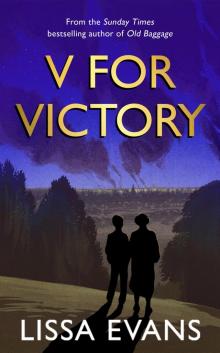 V for Victory
V for Victory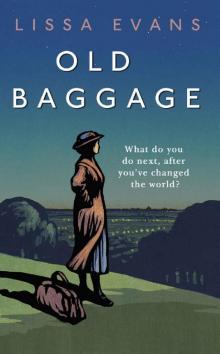 Old Baggage
Old Baggage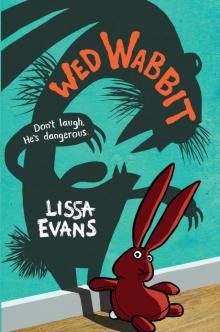 Wed Wabbit
Wed Wabbit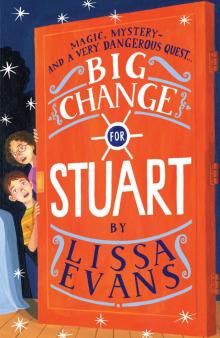 Big Change for Stuart
Big Change for Stuart Spencer's List
Spencer's List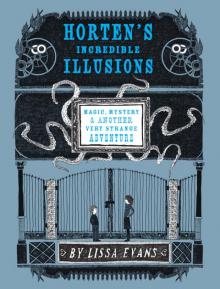 Horten's Incredible Illusions
Horten's Incredible Illusions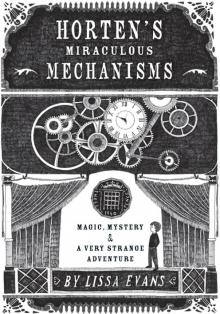 Horten's Miraculous Mechanisms
Horten's Miraculous Mechanisms Their Finest Hour and a Half
Their Finest Hour and a Half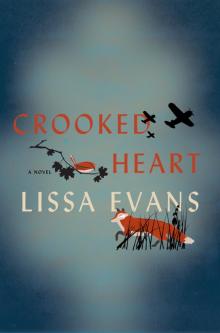 Crooked Heart
Crooked Heart